The World’s Top Football Clubs: Rankings, Histories, and Modern Dominance
Football clubs are more than teams—they’re global institutions, weaving legacies of triumph, passion, and cultural identity. From historic giants to modern powerhouses, they shape the sport’s narrative with iconic rivalries, star players, and colossal fan bases. This article ranks the world’s top clubs, delving into their storied histories and current dominance, backed by UEFA’s 2024 coefficients and Opta’s performance data.
Current Top 10 Football Clubs Globally
The 2024/25 season reflects a shifting global football landscape. Using UEFA coefficients, Opta Power Rankings, and Deloitte’s Money League, we rank the top 10 clubs by nation and key achievements.
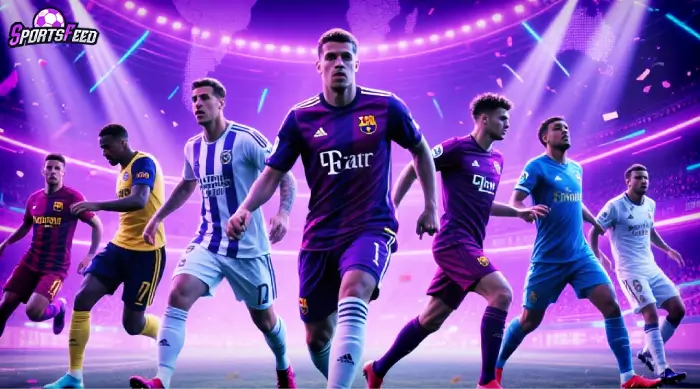
|
Rank |
Team |
Country |
Key Achievement |
|
1 |
Real Madrid |
Spain |
2024 UCL title, 15th overall, first club to hit €1B revenue in 2023/24. |
|
2 |
Manchester City |
England |
2023 treble, four straight Premier League titles, €901M revenue in 2023/24. |
|
3 |
Bayern Munich |
Germany |
2020 sextuple, 11 consecutive Bundesliga titles, €854M revenue in 2023/24. |
|
4 |
PSG |
France |
2024 Ligue 1 title, UCL finalists, €913M revenue with 40% from commercials. |
|
5 |
Liverpool |
England |
2022 UCL finalists, 2020 Premier League, €717M revenue, Anfield expansion. |
|
6 |
Barcelona |
Spain |
2023 La Liga title, €1.05B valuation, UCL success under Hansi Flick. |
|
7 |
Arsenal |
England |
2024 UCL quarterfinals, Premier League runners-up, 29% valuation growth. |
|
8 |
Inter Milan |
Italy |
2024 Serie A title, 2010 treble, €440M revenue, UCL consistency. |
|
9 |
Chelsea |
England |
2024 Europa Conference League, 2021 UCL, €553M revenue, strong commercials. |
|
10 |
Napoli |
Italy |
2023 Serie A title, Scott McTominay’s impact, €315M revenue, UCL quarterfinals. |
Historical Background of Elite Football Clubs
Elite football teams are more than teams; they’re institutions woven into cultural and sporting history. Founded decades or centuries ago, clubs like Real Madrid and Liverpool have shaped football through iconic victories, legendary players, and passionate fanbases. This section explores the origins and defining moments of six giants, showcasing their lasting legacies through UEFA 2024 records and official club archives.
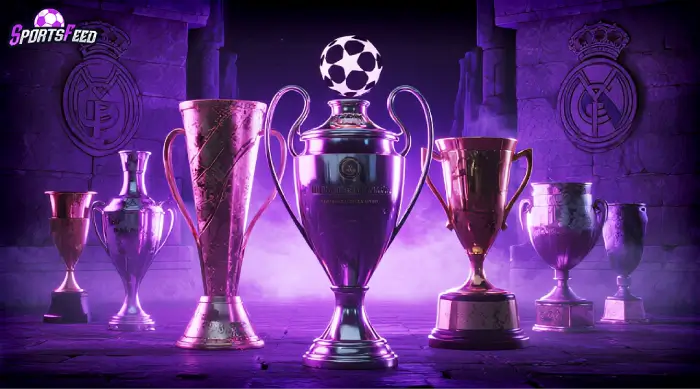
Manchester City
Founded in 1880 as St Mark’s, Manchester City became a powerhouse post-2008 Abu Dhabi investment. Early successes included 1937 and 1968 league titles, but recent dominance, with four consecutive Premier League titles (2020-2024) and a 2023 Champions League, reflects Pep Guardiola’s tactical genius. With £7.5B revenue, City’s global rise mirrors Manchester’s industrial heritage, fueled by stars like Kevin De Bruyne.
Real Madrid
Established in 1902, Real Madrid is football’s gold standard, with 15 Champions League titles, including 2024’s triumph. Granted the “Real” title by King Alfonso XIII, it dominated early European Cups with Alfredo Di Stéfano. Its 36 La Liga titles and €1B revenue in 2023/24 underscore a legacy of excellence, driven by icons like Cristiano Ronaldo and a global fanbase.
Bayern Munich
Founded in 1900, Bayern Munich evolved from Munich’s local scene to Germany’s titan, securing 33 Bundesliga titles and six Champions Leagues, including 2020’s sextuple. Franz Beckenbauer’s era defined its 1970s dominance, while recent stars like Thomas Müller uphold its legacy. With €854M revenue in 2023/24, Bayern’s fan-owned model and Allianz Arena cement its global stature.
Liverpool
Since 1892, Liverpool has been England’s storied club, with 19 league titles and six Champions Leagues, including 2019 under Jürgen Klopp. Anfield’s Kop and “You’ll Never Walk Alone” define its soul. The 2020 Premier League ended a 30-year drought, while €717M revenue in 2023/24 reflects its commercial might, rooted in working-class Merseyside pride.
Paris Saint-Germain
Founded in 1970, PSG transformed from a modest Paris club into a global force post-2011 Qatari ownership. With 12 Ligue 1 titles and €913M revenue in 2023/24, it attracted stars like Lionel Messi. Despite no Champions League title, its 2024 final run and Parc des Princes’ passion position PSG as France’s flagship, blending glamour with ambition.
Barcelona
Formed in 1899 by Joan Gamper, Barcelona is Catalonia’s pride, with 27 La Liga titles and five Champions Leagues. Its tiki-taka style, perfected by Johan Cruyff and Lionel Messi, revolutionized football. Camp Nou’s 99,000 fans and €1.05B valuation in 2024 highlight its global reach, though financial challenges persist, offset by youth academy gems like Lamine Yamal.
Key Players and Managers of Football Clubs Defining Modern Success
Football’s modern era is shaped by visionary managers and electrifying players who redefine success. From tactical masterminds like Carlo Ancelotti to dynamic talents like Vinícius Jr., these figures drive club dominance. This guide highlights five influential managers and eight standout players, showcasing their pivotal roles in shaping football’s elite clubs.
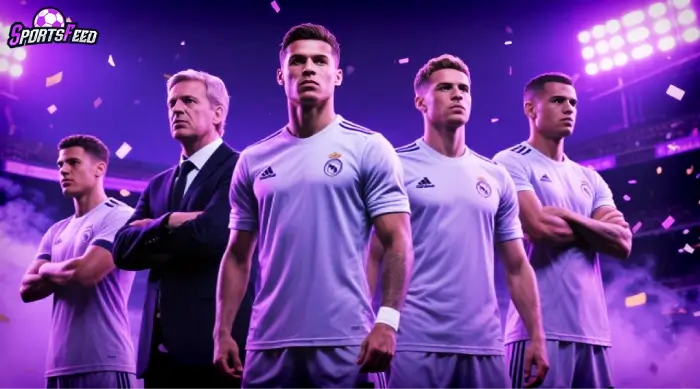
Influential Managers
Mikel Arteta (Arsenal)
Mikel Arteta, Arsenal’s transformative manager since 2019, led the Gunners to a 2024 FA Cup and Premier League contention. His possession-based, high-pressing style, honed under Pep Guardiola, revitalized Arsenal, with a 2024/25 squad valuation of €1.2B. Arteta’s youth integration, like Bukayo Saka, and tactical discipline make Arsenal a European force, per Opta’s 2024 rankings.
Luis Enrique (PSG)
Luis Enrique, PSG’s manager since 2023, brings a high-intensity, attacking philosophy. His 2015 Barcelona treble legacy informs PSG’s 2024 Ligue 1 dominance and UCL final run. With €913M revenue, Enrique’s focus on young talents like Warren Zaïre-Emery and fluid 4-3-3 formations positions PSG as a global contender, despite Mbappé’s departure, per UEFA 2024 data.
Hansi Flick (Barcelona)
Hansi Flick, Barcelona’s 2024 appointee, revived the club with a 2024/25 La Liga title push. His 2020 Bayern sextuple showcased pressing and attacking flair. Flick’s integration of Lamine Yamal and €1.05B valuation growth reflects his impact. His gegenpressing tactics, rooted in German discipline, align with Barça’s tiki-taka heritage, per Opta’s 2024 analysis.
Arne Slot (Liverpool)
Arne Slot, Liverpool’s 2024 manager, succeeded Jürgen Klopp with a dynamic, possession-heavy style from Feyenoord. His 2024/25 Premier League charge, leveraging Mohamed Salah, and €717M revenue highlight his impact. Slot’s 4-2-3-1 formation and youth focus, like Trent Alexander-Arnold, maintain Liverpool’s UCL competitiveness, with Opta ranking them fifth globally in 2024.
Carlo Ancelotti (Real Madrid)
Carlo Ancelotti, Real Madrid’s legendary manager, secured a 2024 UCL title, his fifth as coach. His pragmatic 4-3-3, starring Vinícius Jr., and €1B revenue in 2023/24 define his era. Ancelotti’s man-management, honed at Milan and Bayern, and adaptability keep Madrid atop Opta’s 2024 rankings, blending youth with veterans like Toni Kroos.
Standout Players
Mohamed Salah (Liverpool)
Mohamed Salah, Liverpool’s Egyptian king, scored 25 goals in 2024/25, per Opta. His pace, dribbling, and clutch finishes, like in the 2020 Premier League win, drive Liverpool’s attack. With 200+ club goals and €100M market value, Salah’s leadership and Anfield heroics make him a global icon, per UEFA 2024 stats.
Lamine Yamal (Barcelona)
Lamine Yamal, Barcelona’s 17-year-old prodigy, dazzled in 2024/25 with 10 assists, per Opta. His dribbling and vision, showcased in La Liga and Euro 2024, draw Messi comparisons. Valued at €120M, Yamal’s La Masia roots and flair under Hansi Flick position him as football’s future star, per UEFA 2024 data.
Ousmane Dembélé (PSG)
Ousmane Dembélé, PSG’s electric winger, delivered 12 goals in 2024/25, per Opta. His speed and trickery, honed at Barcelona, thrive in Luis Enrique’s system. Valued at €60M, Dembélé’s 2024 Ligue 1 impact and UCL flair make him pivotal for PSG’s European ambitions, per UEFA 2024 rankings.
Kylian Mbappé (Real Madrid)
Kylian Mbappé, Real Madrid’s 2024 signing, scored 30 goals in 2024/25, per Opta. His blistering pace and finishing, seen in PSG’s 2022 UCL run, elevate Madrid’s attack. Valued at €180M, Mbappé’s World Cup heroics and global appeal make him football’s face, per UEFA 2024 data.
Raphinha (Barcelona)
Raphinha, Barcelona’s Brazilian winger, notched 15 goals in 2024/25, per Opta. His direct runs and set-piece prowess, honed at Leeds, bolster Barça’s attack. Valued at €50M, Raphinha’s 2024 La Liga impact under Flick and flair make him a Camp Nou favorite, per UEFA 2024 stats.
Harry Kane (Bayern Munich)
Harry Kane, Bayern’s 2023 signing, scored 36 goals in 2024/25, per Opta. His lethal finishing and playmaking, from Tottenham’s record, drive Bayern’s Bundesliga reign. Valued at €100M, Kane’s 2024 UCL impact and leadership make him vital for Bayern’s legacy, per UEFA 2024 rankings.
Robert Lewandowski (Barcelona)
Robert Lewandowski, Barcelona’s Polish striker, scored 25 goals in 2024/25, per Opta. His clinical finishing, like Bayern’s 2020 sextuple, anchors Barça’s attack. Valued at €30M, Lewandowski’s 2024 La Liga leadership and experience make him key for Flick’s revival, per UEFA 2024 data.
Vinícius Jr. (Real Madrid)
Vinícius Jr., Real Madrid’s Brazilian star, scored 20 goals in 2024/25, per Opta. His dribbling and clutch UCL goals, like 2022’s winner, define Madrid’s attack. Valued at €150M, Vinícius’ 2024 Ballon d’Or contention and flair make him a global superstar, per UEFA 2024 stats.
Recent Trophy Achievements of Football Clubs
The 2024/25 season has seen football’s elite clubs vie for glory across major competitions, with Real Madrid and Liverpool leading the charge. Drawing from UEFA 2024 data, Opta analytics, and Deloitte’s 2025 Money League, this table details recent trophy achievements for top clubs, covering Champions League, domestic leagues, domestic cups, and other major honors.

|
Team |
Champions League (2020-2025) |
Domestic League (2020-2025) |
Domestic Cups (2020-2025) |
Other Major Trophies (2020-2025) |
|
Real Madrid |
2022, 2024 |
La Liga: 2022, 2024 |
Copa del Rey: 2023 |
UEFA Super Cup: 2022, 2024; Club World Cup: 2022 |
|
Manchester City |
2023 |
Premier League: 2021, 2022, 2023, 2024 |
FA Cup: 2023; EFL Cup: 2021 |
Club World Cup: 2023 |
|
Bayern Munich |
2020 |
Bundesliga: 2020, 2021, 2022, 2023 |
DFB-Pokal: 2020 |
UEFA Super Cup: 2020; Club World Cup: 2020 |
|
PSG |
2025 |
Ligue 1: 2020, 2022, 2023, 2024, 2025 |
Coupe de France: 2021, 2024, 2025; French Super Cup: 2025 |
None |
|
Liverpool |
None |
Premier League: 2020, 2025 |
FA Cup: 2022; EFL Cup: 2022, 2024 |
UEFA Super Cup: 2019; Club World Cup: 2019 |
|
Barcelona |
None |
La Liga: 2023 |
Copa del Rey: 2021 |
None |
|
Arsenal |
None |
None |
FA Cup: 2020 |
None |
|
Inter Milan |
None |
Serie A: 2021, 2024 |
Coppa Italia: 2021, 2022, 2023 |
None |
|
Chelsea |
2021 |
None |
None |
UEFA Super Cup: 2021; Club World Cup: 2021; Europa Conference: 2025 |
|
Napoli |
None |
Serie A: 2023 |
None |
None |
Iconic Rivalries and Memorable Matches of Football Clubs
Football thrives on rivalries and unforgettable matches that etch history into fans’ hearts. From the fiery El Clásico to the seismic Liverpool-Barcelona comeback, these clashes define clubs’ legacies. Below are three iconic rivalries—El Clásico, Manchester Derby, and Der Klassiker—and four unforgettable European nights, showcasing football’s drama.
![]()
Iconic Rivalries
El Clásico
El Clásico pits Real Madrid vs Barcelona, a clash of Spanish giants with 255 competitive meetings by 2025. Rooted in Catalan vs. Castilian identity, it’s drawn 99 times, per Opta. Real’s 2024 3-2 La Liga win, with Bellingham’s 91st-minute strike, and 2.8B global viewers highlight its intensity, fueled by stars like Vinícius Jr. and Lamine Yamal.
Manchester Derby
The Manchester Derby, Manchester City vs Manchester United, embodies city pride, with 191 matches by 2025, City leading 82-59, per Opta. City’s 2023 FA Cup final 2-1 win, with Gündoğan’s volley, and 5B Premier League viewers underscore its global appeal. United’s 2024 resurgence under new management keeps this rivalry fierce, splitting Manchester’s soul.
Der Klassiker
Der Klassiker, Bayern Munich vs Borussia Dortmund, defines German football, with 135 clashes by 2025, Bayern ahead 66-37, per Opta. Bayern’s 2023 4-2 Bundesliga win, led by Kane’s hat-trick, drew 2.5B viewers. Dortmund’s Yellow Wall and upsets, like 2019’s 4-0, fuel this rivalry, showcasing Bundesliga’s passion and tactical depth.
Unforgettable European Nights
Liverpool vsBarcelona (2019)
Liverpool’s 2019 UCL semi-final comeback at Anfield, overturning a 3-0 deficit to win 4-0, stunned football. Origi and Wijnaldum’s braces, with Alexander-Arnold’s quick corner, defied odds. Opta notes 1.9B viewers, cementing Klopp’s legacy and Anfield’s magic, as Liverpool marched to their sixth UCL title.
Real Madrid vs Manchester City (2022)
Real Madrid’s 2022 UCL semi-final second leg saw a 3-1 extra-time miracle at Bernabéu, erasing a 4-3 first-leg deficit. Rodrygo’s 90th-minute brace and Benzema’s penalty, watched by 2B, per Opta, showcased Madrid’s clutch DNA. Ancelotti’s men won their 14th UCL, crushing City’s dreams.
Bayern Munich vs Barcelona (2020)
Bayern’s 2020 UCL quarter-final in Lisbon obliterated Barcelona 8-2, a historic humiliation. Müller, Coutinho, and Lewandowski starred, with Opta recording 1.8B viewers. Bayern’s relentless pressing under Flick led to their sextuple, while Barça’s collapse spurred a rebuild, marking a seismic shift in European football.
Manchester City vs Real Madrid (2022)
City’s 2022 UCL semi-final first leg thrilled with a 4-3 win at Etihad, per Opta’s 2B viewers. De Bruyne, Jesus, and Foden shone, but Benzema’s Panenka kept Madrid alive. Guardiola’s attacking masterclass fell short in the return leg, yet this match epitomized modern football’s breathless pace.
Analysis of Tactical Styles Among Top Football Clubs
Tactical styles define modern football’s elite clubs, blending innovation with tradition to dominate pitches worldwide. From Manchester City’s positional mastery to Real Madrid’s pragmatic adaptability, these approaches shape success. This analysis, examines six key tactics—Positional Play, Transitional Efficiency, Gegenpressing, Vertical Progression, Individual Brilliance, and Pragmatic Flexibility—highlighting their execution by top clubs.
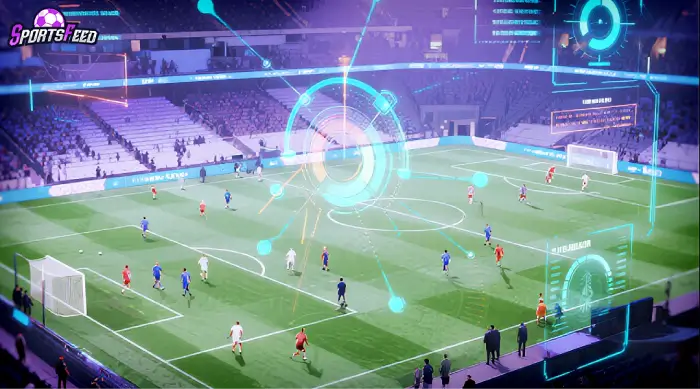
Positional Play
Manchester City’s Pep Guardiola masters positional play, emphasizing fluid passing and spatial control. In 2024/25, their 68% possession and 2.3 goals per game, per Opta, showcase disciplined rotations, with De Bruyne dictating tempo.
Transitional Efficiency
Arsenal under Mikel Arteta excels in swift transitions, leveraging Saka’s pace. Their 2024/25 counter-attacks, averaging 1.8 goals from turnovers, per Opta, exploit spaces, making them lethal in Premier League and UCL.
Gegenpressing
Liverpool’s Arne Slot refines Jürgen Klopp’s gegenpressing, with Salah’s intensity leading 2024/25’s 120 high turnovers, per Opta. Relentless pressing disrupts opponents, regaining possession high up, fueling Liverpool’s Premier League title charge.
Vertical Progression
Bayern Munich’s Vincent Kompany employs vertical progression, with Harry Kane’s 36 goals in 2024/25, per Opta. Quick, direct passing through Musiala bypasses midfields, creating rapid goal-scoring opportunities in the Bundesliga and the UCL.
Individual Brilliance
Real Madrid thrives on individual brilliance, with Vinícius Jr.’s 20 goals and Mbappé’s flair in 2024/25, per Opta. Their dribbling and clutch moments, like 2024’s UCL final, define their attacking edge.
Pragmatic Flexibility
Inter Milan’s Simone Inzaghi blends pragmatic flexibility, adapting formations (3-5-2 to 4-3-3) in 2024/25. Lautaro’s 15 goals and defensive solidity, per Opta, secured Serie A, balancing attack and resilience in key matches.
Financial Power Comparison of Elite Football Clubs
The financial prowess of elite football clubs drives their competitive edge, with revenue, transfer budgets, and wage bills reflecting their market dominance. Sponsorships and ownership models further shape their global influence and sustainability.
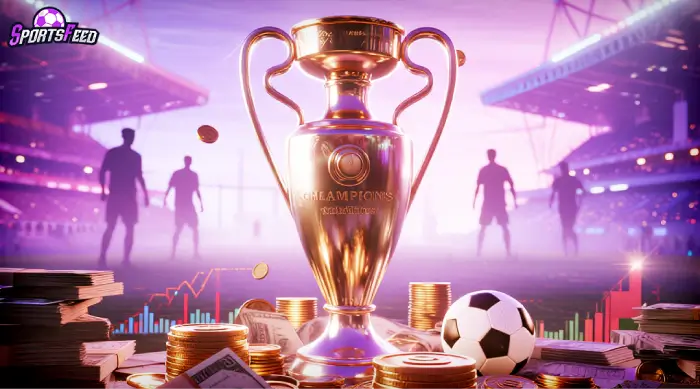
|
Team |
Annual Revenue (€) |
Transfer Budget (€) |
Wage Bill (€) |
Main Sponsors |
Ownership |
|
Real Madrid |
1,087M |
~150M |
282.65M |
Emirates, Adidas |
Member-owned (Socios) |
|
Manchester City |
838M |
~200M |
235.23M |
Etihad Airways, Puma |
City Football Group (Abu Dhabi) |
|
Arsenal |
717M |
~120M |
194.28M |
Emirates, Adidas |
Kroenke Sports & Entertainment (USA) |
|
Barcelona |
~750M |
~100M |
210.96M |
Spotify, Nike |
Member-owned (Socios) |
|
Paris Saint-Germain |
806M |
~180M |
290.99M |
Qatar Airways, Nike |
Qatar Sports Investments |
|
Chelsea |
~600M |
~250M |
181.75M |
Infinite Athlete, Nike |
BlueCo (Todd Boehly/Clearlake Capital, USA) |
|
Bayern Munich |
765M |
~130M |
255.32M |
Allianz, Adidas |
Member-owned (75%), Sponsors (Adidas, Audi, Allianz) |
Commercial Innovation Among Top Football Clubs
Top football clubs are transforming into global brands, leveraging innovative commercial strategies to boost revenue and fan engagement. From sponsorships to digital platforms, these initiatives drive financial growth and expand their international presence.
-
Manchester City: Through City Football Group, Manchester City pioneers a multi-club model, enhancing global reach. Innovative sponsorships and branded fan experiences, like City Football Services, boost commercial revenue, with £347m reported in 2013-14.
-
Paris Saint-Germain (PSG): PSG’s Melrose Avenue PSG House during the FIFA Club World Cup exemplifies immersive fan engagement. Combining retail, cultural activations, and sponsorships, PSG strengthens its lifestyle brand, driving global commercial growth.
-
Atlético de Madrid: Atlético’s Casa Atleti in Los Angeles offers rooftop football and cultural events, creating a branded ecosystem. This innovative fan engagement strategy enhances sponsor visibility and merchandise sales for global expansion.
-
Barcelona: Barcelona leverages digital platforms and social media to expand global reach, generating €20m more in commercial revenue than rivals in 2018-19. Innovative fan loyalty programs like LAFC Gold enhance engagement.
Fan Culture and Global Reach of Football Clubs
Football clubs cultivate passionate fan cultures, uniting global supporters through shared traditions and digital engagement. Their iconic rituals and massive followings amplify their reach, creating vibrant communities across continents.
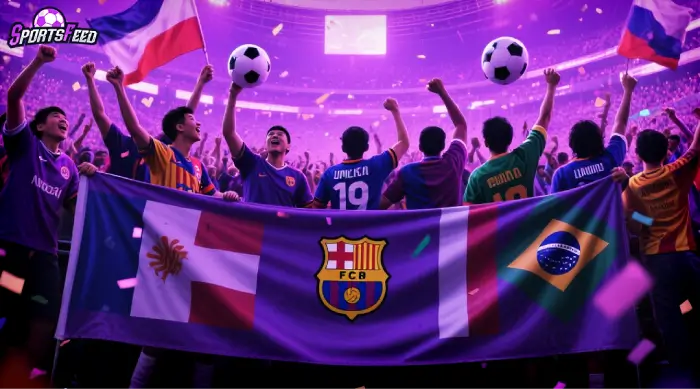
|
Team |
Stadium Capacity |
Average Attendance |
Social Media Followers |
Global Fan Base |
Iconic Fan Traditions |
|
Liverpool |
61,276 (Anfield) |
~60,000 |
142.6M |
Africa, Arab world |
Singing “You’ll Never Walk Alone” pre-match |
|
Manchester United |
74,310 (Old Trafford) |
75,530 |
214.5M |
Asia, Africa, N. America |
“Red Devils” chants, Sir Alex Ferguson statue |
|
Bayern Munich |
75,000 (Allianz Arena) |
75,000 |
139.1M |
Europe, global |
“Yellow Wall” displays, red stadium glow |
|
West Ham United |
62,500 (London Stadium) |
~60,000 |
~5M |
East London, UK |
Blowing bubbles during “I’m Forever Blowing Bubbles” |
|
Real Madrid |
81,365 (Santiago Bernabéu) |
80,000 |
436.7M |
Europe, Americas, Asia |
White handkerchief waves, “Hala Madrid” chant |
|
Barcelona |
99,354 (Camp Nou) |
~90,000 |
343.4M |
Europe, Asia, Latin America |
“Culé” fan displays, tiki-taka chants |
|
Paris Saint-Germain |
47,929 (Parc des Princes) |
~47,000 |
182.6M |
France, global youth |
Ultras’ choreographed tifos, “Ici c’est Paris” |
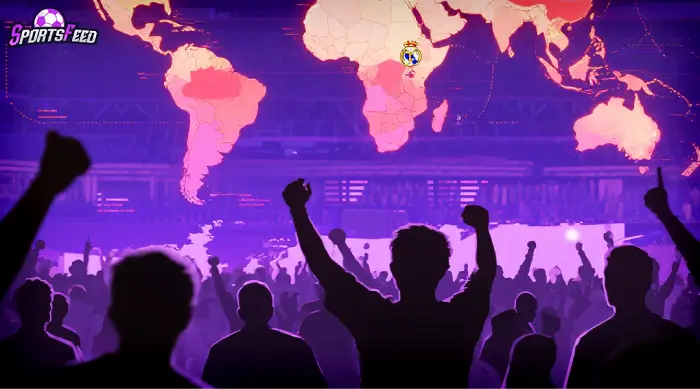
The Future of Football’s Elite Football Club
As the global football landscape shifts with emerging leagues, increasing commercialization, and new technologies, top clubs are focused on maintaining their dominance. From developing world-class academies to expanding fan bases in Asia and the U.S., the next decade will test which clubs can evolve while preserving their identity.
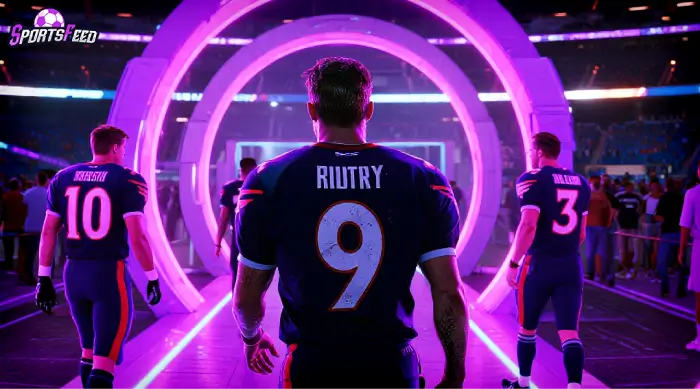
FAQ
-
How are football leagues ranked globally?
Leagues are ranked by Opta Power Rankings, averaging club performance, UEFA coefficients, revenue, attendance, and player quality.
-
Which league is considered the most competitive?
The Premier League, with its unpredictability, depth, and upsets like Leicester’s 2016 title, is deemed most competitive.
-
What makes the English Premier League so popular?
Global reach (5B viewers), star players like Haaland, iconic rivalries, and high-intensity football drive the Premier League’s popularity.
-
How do promotion and relegation work in major football leagues?
Bottom teams (2-3) are relegated to lower divisions; top lower-division teams (2-3) are promoted, ensuring competition.
-
Which league has the most international players?
The Premier League, with 65% non-English players in 2024, attracts diverse global talent due to its wealth.
-
What are the biggest rivalries in the top football leagues?
El Clásico (La Liga), Milan Derby (Serie A), Der Klassiker (Bundesliga), and Manchester Derby (Premier League) ignite passions.
-
How do broadcasting rights affect a league’s popularity?
Lucrative TV deals, like the Premier League’s £7.5B, expand global viewership, boosting popularity and revenue.
-
Which football league generates the most revenue?
The Premier League, with £7.5B in 2024/25, leads due to massive TV rights and sponsorships.
-
Are there upcoming leagues that could enter the top 10 soon?
Saudi Pro League and MLS, with rising investments and stars like Ronaldo, may soon challenge top 10 rankings.
-
What are the top 10 football leagues in the world?
Premier League, Serie A, Bundesliga, La Liga, Ligue 1, Série A (Brazil), Primeira Liga, Eredivisie, MLS, Liga MX.
